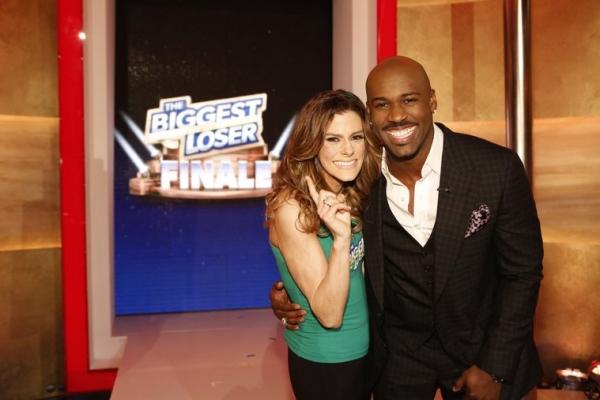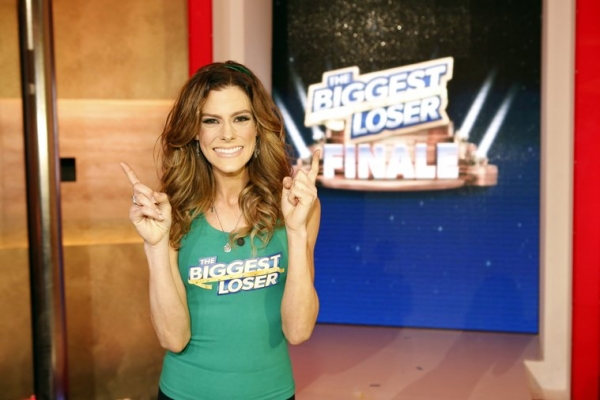Last night’s Biggest Loser finale wasn’t exactly the celebration we were all hoping for. Rachel Frederickson, a favorite to win, and one of our favorite contestants to watch, was named the Biggest Loser over Bobby Saleem and David Brown. Her victory should have been wonderful, but instead had a sour taste to it.
What stuck out was how thin she appeared to be. At just 105 pounds, Rachel lost 60 percent of her body weight during her Biggest Loser journey, setting a new record for highest percentage of body weight lost during the show. NBC has offered “No comment” about Rachel’s weight loss.
Mary Hartley, R.D., spoke out against the speed at which Rachel lost weight.
“Fast weight loss is often associated with muscle loss and protein-calorie malnutrition since protein from the muscles and organs is converted to glucose to feed your brain. Muscle glucose makes up for the lack of glucose coming in. Rapid weight loss, and any starvation, leads to psychological changes that promote binge eating as the body attempts to replace lost mass.”
From a starting weight of 260 pounds, Rachel lost 155 pounds in 7 months. What concerns us about her weight loss is Rachel admits to being 5’5″ tall which puts her current BMI at 17.5. That’s solidly in the underweight range, and she is the only contestant in Biggest Loser history (worldwide) to end their season underweight.
Today we had the chance to speak with Rachel and hear what she had to say.
DIR: What did you do, once you were home, to reach your finale weight of 105 pounds?
Rachel: We go home, for quite a while, 3.5 months. I continued to follow the support system I had from The Biggest Loser. I continued to follow Dolvett’s exercise plans and Dr. Cheryl’s meal plans. I worked part time and worked out a ton! I used a walking treadmill kind of constantly, and attended three to four workout classes a day. I eat 1600 calories a day. It [the diet plan] comes from my support system at The Biggest Loser; they give us a calorie budget.
DIR: Do you believe you’re at a healthy and sustainable weight?
Rachel: I feel absolutely great. I’m officially that proud, confident girl that I lost. I found the athlete in me again. My body is going to balance and find its new rhythm.
When asked whether she feels if she’s too thin, or has lost too much weight, Rachel spoke about her new-found confidence. “I have been on a 7.5 month journey,” she said. “That athlete in me, I lost her, missed her, and through each competition on Biggest Loser I saw her come out. I’m very enthusiastic and excited. I’m now finding that balance.”
Hartley says that a weight loss like Rachel’s should have taken at least 1.5 years, if not 3 years or more. “Slower weight loss has a better chance of being maintained. It gives times to try out and practice new behaviors in real life along with its holidays, stresses, athletic, injuries, pregnancies, and the rest.”
“I am no fan of The Biggest Loser. The contestants see massive weight loss because they drop their intake down to 1200 calories when their usual intake was probably around 5000 a day. And then they burn an extra 1000 calories through vigorous exercise led by a drill sergeant for 3-4 hours a day. That’s just abusive,” Hartley said. “I fear for Rachel and I am not impressed.”
Despite the controversy surrounding her win, Rachel sounds just as optimistic as ever, and you could hear her ever-present smile in her voice. “My goals are to be healthy and strong. My journey was my path on Biggest Loser. I followed the advice and support the entire journey.”
Tumi Oguntala was the at-home winner this year, though her victory has been overshadowed in the hours since the finale. She lost 175 pounds for a final weight of 144 pounds. She also set a record for body weight percentage lost by an at-home contestant with 55 percent weight lost.
Images from nbc.com
Also Read:
Rachel’s 60 Percent Weight Loss is Nothing to Celebrate; Biggest Loser Should be Ashamed
6 Things to Know About the New Biggest Loser Club
Alison Sweeney Talks to Redbook About Staying Fit: “It’s Not About Dieting”



